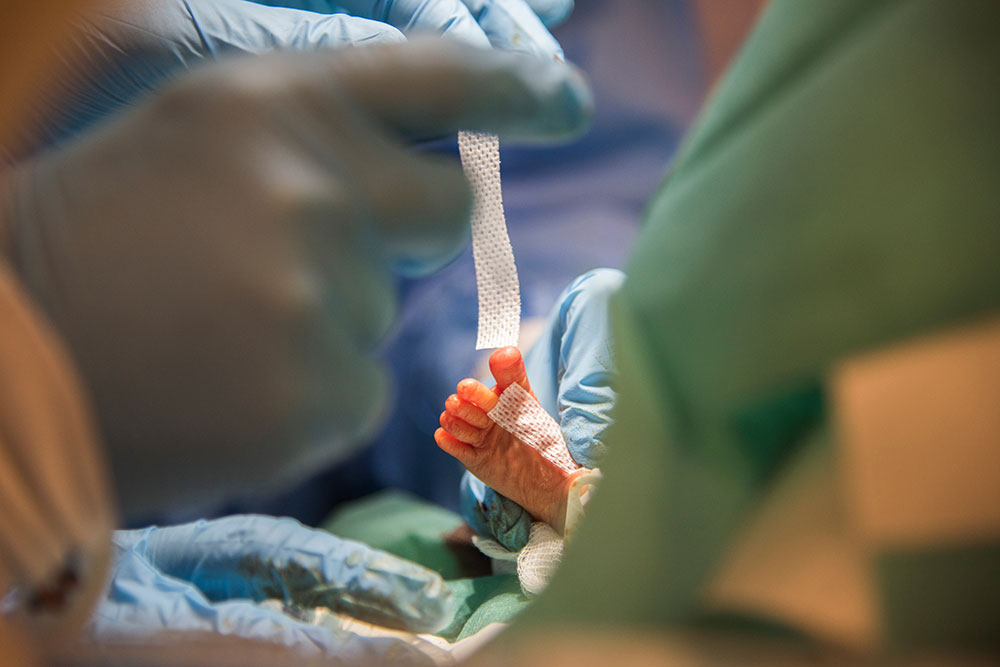What To Expect When the NICU Team Is in the Delivery Room

Your newborn is in the safest of hands with these specialty providers.
Medical Experts: Keyaria Denise Gray, DO; Kim Zimmerman, MSN, RNC-OB, NEA-BC
Once you’ve made it to the finish line of pregnancy and into the delivery room, you’re sure to see a lot of new faces. By now, you’ve likely come to know your provider or practice staff well, but there will be a whole new crew of nurses, specialists, and more once you’re all checked into the hospital or childbirth center.
While every expecting parent should be prepared to have a few strangers in their delivery room, some will have an extra team of pros present from the neonatal intensive care unit (NICU). However, since only a small portion of babies need NICU support, this intervention usually isn’t thoroughly covered in birthing classes, which means that most families won’t know what to anticipate when the time comes—which can be really scary.
To get a better understanding of what to expect from a NICU team during delivery, we turned to Kim Zimmerman, MSN, RNC-OB, NEA-BC, assistant vice president of the women’s division at Carolinas Medical Center, and Keyaria Denise Gray, DO, assistant professor in pediatrics with a specialty in neonatology at Duke University School of Medicine.
Reasons for a NICU Team in the Delivery Room
In some cases, you might know going into labor and delivery that the chances of needing a NICU team present are very likely, such as if you’ve experienced a high-risk pregnancy or are in premature labor.
“We will call and ask the NICU team to be present at any high-risk delivery such as if you are delivering more than a few weeks early—less than 35 weeks, your baby has had any known complications during your pregnancy, [or] if your clinical team has any other concerns about your labor and delivery,” says Zimmerman.
Other examples Dr. Gray provides include if “the obstetrician anticipates there may be complicating factors for the mom or baby” such as infection in Mom or abnormal heart rates in the baby that could be signs of distress.
Depending on the situation, you might not know that you’ll need a NICU team in the delivery room until the first few moments after the baby has been delivered. For instance, Zimmerman says a NICU team will be brought in if the care team is “concerned about how your baby is transitioning once they are born.”
NICU Team Members and Their Roles
Again, you’re going to see a lot of new faces in the delivery room. And if you’re the birthing parent, you’ll likely be a little preoccupied with, you know, giving birth during all of these introductions, which might make it hard to retain everyone’s name and why they are there.
According to Dr. Gray, “A NICU team would include a respiratory therapist and a nurse who routinely attends deliveries to take care of the baby.” Additionally, both Zimmerman and Dr. Gray say, depending on the situation, physicians and nurse practitioners who specialize in neonatology may also be present in case any immediate support or treatment is needed for the baby upon delivery.
As for what each of these people is responsible for, it depends on the circumstances. If there are specialty physicians or nurse practitioners present, then they are likely there for a specific purpose that is known ahead of time. The basic team, however, is simply there to evaluate the baby and step in for care if necessary.
“The NICU team is available to examine the baby and provide any support that the baby might need after birth,” says Dr. Gray, “Most babies will only need the basic steps of neonatal resuscitation, meaning keeping the baby warm and dry and stimulating them to cry.”
How the NICU Presence Can Affect a Parent’s Experience
We’ve all been told how important the first hour after birth is for successful bonding and breastfeeding. Providers will often put healthy babies directly on Mom’s chest after birth—before even cleaning the newborn—to get skin-to-skin contact started as quickly as possible. But when a NICU team is on the scene, what changes?
“If the neonatal team is present in the delivery room, [upon birth] they will take the baby to the warmer and do an initial assessment and stabilization if necessary. They will communicate with you and let you know how your baby is doing,” explains Zimmerman.
Because of this swift transition, Zimmerman says, “this process will most likely delay your ability to hold your baby and have skin-to-skin time,” adding, “It depends on how many weeks gestation your baby is and how well your baby does in the first few minutes after delivery.”
That said, Dr. Gray stresses that the NICU team wants the best for your baby, and they don’t want to delay your precious skin-to-skin contact any longer than necessary.
“The NICU team is very supportive of skin-to-skin time and its many benefits for mom and baby. For babies that are doing well after delivery, some exams may be performed while the baby is on the mother’s chest to help with bonding. Sometimes it is safest for the baby to be evaluated at a warmer in the delivery room [and] when this happens, the goal is to return the baby to the mom as soon as possible.”
One significant way the NICU team can potentially impact a parent’s delivery experience is by simply being present without much explanation. When parents aren’t properly informed about the team’s role and why they are there in the first place, it can create anxiety (and an unpleasant experience). This is never what the NICU team—or any other labor and delivery provider—wants, so both Dr. Gray and Zimmerman urge parents to communicate with the team and ask as many questions as they need to feel comfortable.
“The NICU team is present to support the baby when needed,” explains Dr. Gray, “For some families, the presence of the team may feel intimidating when a baby needs many hands to provide support during delivery. Our goal is always to provide immediate care for the baby and to keep close communication with the family during one of their most important and memorable days.”
The delivery room can be a stressful place, even when things go perfectly according to plan, and the presence of a NICU team can add to the uncertainty of the event. However, as unnerving as it may seem, it’s important to remember that the NICU team is on your side because everyone in that room is there to ensure the best possible care and outcome for your sweet baby.







